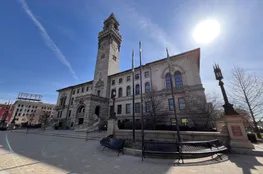Abortion and reproductive rights have become pivotal issues in various high-profile races across the United States, including for president and governor roles in North Carolina—a battleground state with more moderate abortion restrictions compared to its Southern neighbors. This issue is especially crucial in the race for a seat on the North Carolina Supreme Court, where abortion rights supporters emphasize its importance in potentially shaping future legislative decisions. Currently, Registered Republicans hold a majority with five of the seven seats, and the upcoming Tuesday's election could further expand this advantage.
Justice Allison Riggs, a Democrat, is focusing her reelection campaign on her staunch support for reproductive rights. She criticizes her GOP rival's stance, emphasizing the potential shift in the court's approach to abortion laws. Riggs's first television ad notably featured images of Republican Lt. Gov. Mark Robinson, who aims to impose stricter abortion limits than the existing 12 weeks. Riggs argues that this issue is not only central to voters but that her Republican opponent, Jefferson Griffin, might influence the court's stance towards more restrictive abortion policies.
The North Carolina Supreme Court race is a reflection of how abortion issues are driving high-stakes campaigns for judicial seats across the country. Both left and right-wing groups are investing heavily to influence courts that could determine key legal outcomes involving abortion, voting rights, redistricting, and other contentious issues for years. The U.S. Supreme Court's decision in 2022, which overturned half a century of constitutional protections for abortion, has highlighted the pivotal role state courts play in such debates.
Douglas Keith, a senior counsel at the Brennan Center, notes that races for state high courts have gained significant attention as political landscapes shift. This year, elections are being held for 82 Supreme Court seats across 33 states, with record-breaking spending witnessed in previous cycles in states like Wisconsin and Pennsylvania. Progressive groups have ramped up their spending dramatically, with the American Civil Liberties Union investing over $5.4 million in states like Montana, Michigan, North Carolina, and Ohio. Additional funds from Planned Parenthood and the National Democratic Redistricting Committee are also channeling $5 million into court races in several key states.
The state of Ohio represents a critical battleground, where Republicans currently have a slim majority in the Supreme Court. Democrats are defending two seats, and the stakes are high following a judge's ruling against the state's stringent abortion restrictions, deemed unconstitutional by a recent amendment. Other crucial races include those in Michigan, where court nominations are sought at party conventions, despite technically being nonpartisan races. Justice Kyra Harris Bolden, the first Black woman on Michigan’s Supreme Court, is defending a seat against Republican nominees, highlighting the significance of these races beyond traditional party politics.
In Montana, heated contests for the Supreme Court are underway, with progressive and conservative groups fiercely opposing each other's candidates. Campaigns are rife with rhetoric centering on privacy rights and the constitutional right to abortion, especially targeting rulings that previously supported reproductive freedoms. Meanwhile, Republican State Leadership Committee engages in similar battles across other contested states like Arizona and Texas, where they are promoting broader conservative agendas.
In North Carolina, Riggs's campaign strategy, focusing on abortion rights, has drawn criticism for allegedly breaching judicial ethics. Nonetheless, Riggs defends her approach, maintaining that discussing her values is essential for voters to make informed decisions. Such sentiments echo throughout numerous states, where the fight for state Supreme Court seats is becoming a pivotal battlefield for nationwide ideological and legislative shifts.
























